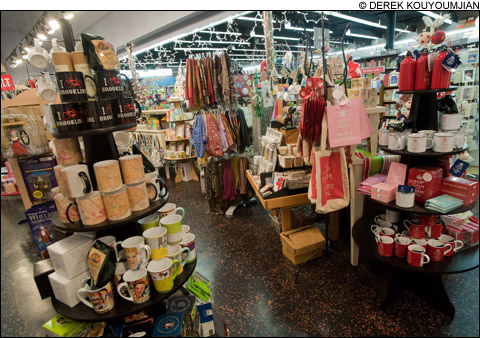
ON THE SIDE Forced to compete with the big chains, local independent bookstores in Cambridge (left) and Brookline turned to less-traditional wares, including used books, discount titles, and gift items — even plast squirting goldfish — to keep customers coming in. |
Boston is pocked by vacant storefronts. Businesses don't sell in this economy; they just disappear. But there is one exception: of all things, bookstores are selling like proverbial hotcakes.
Consider: Asemi retired tech executive and his wife bought the Harvard Book Store in October of 2008 — two weeks after Lehman Brothers declared bankruptcy. In mid-September of this year, a few days after Reuters reported United States poverty rates at a 15-year high, an investment-portfolio manager and his wife bought the Wellesley Booksmith. Last Wednesday, when Patrick Carrier told PublishersWeekly he was selling the Globe Corner Bookstore in Harvard Square, two people had already expressed interest in buying it. Argue all you want about whether people buy books anymore. In Boston, sales of independent bookstores seem to be recession-proof."People are scrambling to buy them," says Paul Siegenthaler, founder and president of the Needham-based brokerage Ridge Hill Partners. Siegenthaler brokered the sales of Harvard Book Store and the Wellesley Booksmith. When the owners of the New England Mobile Book Fair announced earlier this month that they were poised to sell, they chose Siegenthaler to make the deal.
Siegenthaler did not set out to become Boston's independent-bookstore broker. "We just sort of fell into it," he tells me. Although not deliberate, his role has afforded him a strange position in the literary marketplace, and the broker brings unlikely tidings of hope.
The late '90s and the aughts saw the massacre of hundreds of independents amid the rise of Borders and Barnes and Noble, whose monolithic size enabled them to offer discounts far greater than the stand-alone outlets whose turf they invaded. Among the casualties were local stalwarts like Wordsworth in Harvard Square and Avenue Victor Hugo on Newbury Street. Many assumed the arrival of amazon.com, and later, e-readers, would be the final nails in the coffin for indies.
But now, the chains are going belly-up, in part due to rapid expansion and outmoding at the hands of digital competition. Barnes and Noble, its stock in decline and its shareholders at loggerheads, went up for sale in August. Borders has been fighting bankruptcy rumors for at least a year. Neither made adequate or timely inroads into Internet sales or — the tardy, if comely, Nook notwithstanding — e-book platforms. Both companies are closing outlets.
As the bookstore megafauna topple, what's left is a warmblooded, hardier breed of independents, altered but thriving.
That's why these businesses are so desirable to his clients, Siegenthaler says. "In the right locations and with a proven track record, these stores can do very well."
Why? "People just love them."
'Us versus the world'
It's true: people love bookstores. In 1998 — the same year that Meg Ryan and Tom Hanks immortalized the saga of the beleaguered independent and the monolithic chain — I began my career as an independent bookseller. For nearly 12 years, I stocked shelves, sold books, and cleaned up the occasional puddle of child piss.